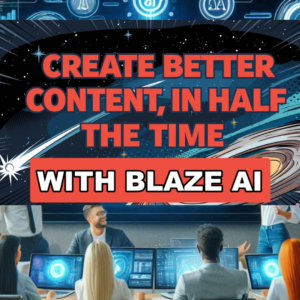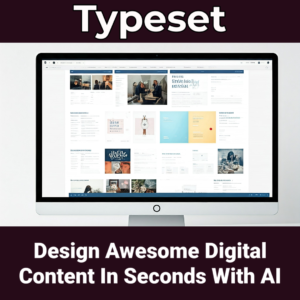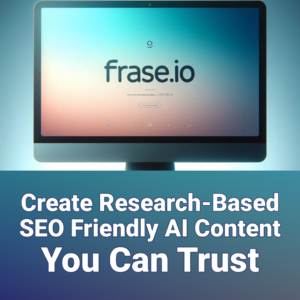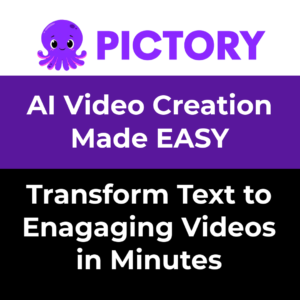Generative AI is a type of artificial intelligence that creates new content from existing data. Think of it as a tool that can write articles, make images, and even compose music by learning from patterns in data. This makes it very useful in many fields, especially marketing.
Generative AI stands out because it can understand and mimic human-like content creation. It doesn’t just repeat information; it creates new ideas and formats. This gives marketers fresh, engaging content that connects with their audience. This technology is not just a fad; it’s a revolution that offers endless possibilities for innovation and efficiency in marketing.
How Generative AI Works
Generative AI uses advanced systems called neural networks, like Generative Adversarial Networks (GANs) and Transformer models. These systems analyze large amounts of data to understand patterns and structures, allowing them to create new, original content.
GANs have two parts: the generator and the discriminator. The generator makes new data, while the discriminator evaluates it. This back-and-forth process continues until the generator makes data that the discriminator can’t tell apart from real data. This method is great for making realistic images and videos.
Transformer models are better for text generation. They use attention mechanisms to process and create text, making them perfect for writing articles, social media posts, and emails. These models understand context and generate coherent, relevant content, making them essential tools for marketers.
Applications of Generative AI in Marketing
Generative AI is changing marketing by offering many applications that boost creativity, efficiency, and personalization. Here are some key areas where Generative AI is making a big impact:
- Content Creation: Tools like Jasper and ChatGPT help create high-quality text quickly. Marketers can use these tools to write blog posts, social media updates, and email campaigns, saving time and resources while keeping a consistent brand voice.
- Image Generation: Platforms like DALL-E 2 and Adobe Firefly help marketers create unique and engaging visuals for their campaigns. These tools can make custom images based on specific prompts, allowing for highly personalized and visually appealing content.
- Customer Interaction: AI-powered chatbots and virtual assistants improve customer service by providing instant, personalized responses. These tools can handle many customer queries, from answering common questions to helping with purchases, improving customer satisfaction and loyalty.
- SEO Tools: AI-driven SEO tools optimize content for search engines, improving visibility and reach. These tools analyze keywords, suggest improvements, and even create SEO-friendly content, helping marketers achieve better search engine rankings and drive more organic traffic to their websites.
Generative AI is not just a tool; it’s a game-changer that is redefining how marketers create and deliver content. By using Generative AI, marketers can stay ahead, offering innovative and personalized experiences that connect with their audience.
Insights from HubSpot’s State of AI Survey
Current Usage of AI in Marketing
HubSpot’s State of AI Survey shows how AI is currently used in marketing. The survey, which gathered data from over 1,000 U.S. professionals, reveals that many marketers are already using AI tools to streamline their strategies and improve efficiency.
One key finding is that AI is widely used for content creation. Marketers use AI-powered tools to generate blog posts, social media updates, and email campaigns, allowing them to produce high-quality content quickly and efficiently. This not only saves time and resources but also ensures a consistent brand voice across all channels.
Another area where AI is making a big impact is customer interaction. AI-powered chatbots and virtual assistants handle customer queries, provide personalized recommendations, and assist with purchases. This not only improves customer satisfaction but also frees up human agents to focus on more complex tasks.
Expectations for the Future
The future of AI in marketing looks very promising, with continuous advancements expected to offer even more sophisticated tools and capabilities. Marketers believe that AI will keep evolving, providing new ways to enhance creativity, efficiency, and personalization.
One exciting prospect is the potential for AI to offer even more personalized experiences. As AI technology improves, it will be able to analyze customer data more effectively, allowing marketers to create highly targeted campaigns that resonate with individual customers. This level of personalization can significantly improve customer engagement and loyalty.
Another area of growth is the use of AI for predictive analytics. By analyzing past data, AI can predict future trends and behaviors, allowing marketers to make more informed decisions and stay ahead of the competition. This can be particularly useful for identifying emerging trends, optimizing marketing strategies, and improving ROI.
Key Findings and Statistics
HubSpot’s survey provides several key data points that highlight the current state and future potential of AI in marketing:
- High Adoption Rates: Many marketers are already using AI tools for content creation, customer interaction, and data analysis. This shows a strong adoption rate and a growing recognition of the benefits of AI in marketing.
- Positive Outlook: Most marketers have a positive outlook on the future impact of AI on their strategies. They believe that AI will keep evolving and offer new opportunities for innovation and efficiency.
- Increased Investment: Many companies are increasing their investment in AI technology, recognizing its potential to drive business value. This includes investing in AI-powered tools, hiring AI experts, and developing AI-driven strategies.
- Improved Efficiency: Marketers report that AI has significantly improved their efficiency, allowing them to produce high-quality content quickly, handle customer queries more effectively, and make more informed decisions.
These findings highlight the transformative potential of AI in marketing and underscore the importance of staying ahead by leveraging AI technology.
Expert Perspectives on Generative AI
Insights from Industry Leaders
To understand the potential and challenges of integrating AI into marketing, it’s essential to consider the insights of industry leaders. Experts from brands like Jasper, ZoomInfo, and Mention.com provide valuable perspectives on how AI is transforming the marketing landscape.
One key insight from these experts is the transformative power of AI. They highlight how AI enables marketers to create more personalized and engaging content, improve customer interactions, and make more informed decisions. AI is not just a tool; it’s a game-changer that is redefining how marketers approach their strategies.
Another important insight is the need for continuous innovation. AI technology is constantly evolving, and marketers need to stay ahead by exploring new applications and capabilities. This includes experimenting with new AI tools, staying updated on the latest trends, and continuously refining their strategies to leverage the full potential of AI.
Potential and Challenges
While AI offers many benefits, it also presents several challenges that need to be addressed to fully harness its potential. One main challenge is data privacy. As AI relies on vast amounts of data to function effectively, ensuring the privacy and security of this data is crucial. Marketers need to implement strong data protection measures and comply with relevant regulations to safeguard customer information.
Another challenge is the risk of bias in AI outputs. AI systems can sometimes produce biased results based on the data they are trained on. This can lead to unfair or discriminatory outcomes, which can damage a brand’s reputation. To address this issue, marketers need to ensure that their AI tools are trained on diverse and representative data and continuously monitor and refine their algorithms to minimize bias.
Ethical considerations are also very important. The development and use of AI should be guided by ethical principles to ensure that it is used responsibly and transparently. This includes being transparent about how AI is used, ensuring that AI tools are developed and used in a way that benefits society, and addressing any ethical concerns that may arise.
Ethical Considerations
Ethical AI development is crucial for building trust and maximizing the positive impact of AI. Marketers need to ensure that their AI tools are used responsibly and transparently, and that they comply with relevant ethical guidelines and regulations.
One key ethical consideration is transparency. Marketers should be transparent about how AI is used in their strategies and ensure that customers are aware of how their data is being used. This includes providing clear and concise information about AI tools and their capabilities, as well as being open about any potential risks or limitations.
Another important consideration is fairness. AI tools should be developed and used in a way that ensures fair and unbiased outcomes. This includes training AI systems on diverse and representative data, continuously monitoring and refining algorithms to minimize bias, and addressing any ethical concerns that may arise.
Finally, marketers need to ensure that their AI tools are used in a way that benefits society. This includes using AI to create positive and meaningful experiences for customers, addressing any potential negative impacts, and ensuring that AI is used in a way that aligns with broader societal goals and values.
AI Tools Revolutionizing Marketing
Content Creation Tools
Generative AI tools like Jasper and ChatGPT are changing content creation by producing high-quality text quickly and efficiently. These tools use advanced algorithms and neural networks to generate content that is coherent, contextually relevant, and engaging.
Jasper, for example, is an AI-powered writing assistant that can generate blog posts, social media updates, email campaigns, and more. It uses natural language processing (NLP) to understand context and generate content that aligns with a brand’s voice and tone. This allows marketers to produce high-quality content quickly and efficiently, saving time and resources.
ChatGPT, on the other hand, is a conversational AI model that can generate human-like text based on specific prompts. It can be used to create engaging and personalized content for various marketing channels, including social media, email, and customer support. By leveraging the power of ChatGPT, marketers can create content that resonates with their audience and drives engagement.
Image Generation Tools
Platforms like DALL-E 2 and Adobe Firefly are changing how marketers create visuals for their campaigns. These tools use advanced algorithms to generate unique and engaging images based on specific prompts, allowing for highly personalized and visually appealing content.
DALL-E 2, for example, is an AI model developed by OpenAI that can generate images from textual descriptions. This allows marketers to create custom visuals that align with their brand’s message and aesthetic. Whether it’s creating product images, social media graphics, or marketing collateral, DALL-E 2 offers endless possibilities for creativity and personalization.
Adobe Firefly, on the other hand, is an AI-powered design tool that enables marketers to create stunning visuals quickly and easily. It uses machine learning algorithms to analyze design elements and generate custom graphics that are visually appealing and on-brand. This allows marketers to create high-quality visuals without the need for extensive design skills or resources.
Customer Interaction Tools
AI-powered chatbots and virtual assistants are improving customer service by providing instant, personalized responses. These tools can handle many customer queries, from answering common questions to helping with purchases, improving customer satisfaction and loyalty.
Chatbots, for example, can be integrated into websites, social media platforms, and messaging apps to provide instant support to customers. They use natural language processing (NLP) to understand and respond to customer queries, providing personalized and relevant information. This not only improves customer satisfaction but also frees up human agents to focus on more complex tasks.
Virtual assistants, on the other hand, can provide more advanced support by handling complex queries and tasks. They can assist with scheduling appointments, processing orders, and providing personalized recommendations, improving the overall customer experience. By leveraging the power of AI, virtual assistants can provide a seamless and efficient customer service experience.
SEO and Data Analysis Tools
AI-driven SEO tools and data analytics platforms are helping marketers optimize their content and strategies, ensuring better performance and higher ROI. These tools use advanced algorithms to analyze keywords, suggest improvements, and even generate SEO-friendly content, helping marketers achieve better search engine rankings and drive more organic traffic to their websites.
SEO tools, for example, can analyze a website’s content and provide recommendations for improving its search engine visibility. This includes identifying relevant keywords, optimizing meta tags, and suggesting content improvements. By leveraging the power of AI, these tools can provide actionable insights that help marketers improve their SEO strategies and achieve better results.
Data analytics platforms, on the other hand, can analyze large amounts of data to provide insights into customer behavior, campaign performance, and market trends. This allows marketers to make more informed decisions and optimize their strategies for better performance. By leveraging the power of AI, data analytics platforms can provide valuable insights that help marketers stay ahead of the competition and achieve their business goals.
The Future of AI in Marketing
Emerging Trends and Innovations
The future of AI in marketing is very promising, with continuous innovations expected to further enhance creativity, efficiency, and personalization. As AI technology continues to evolve, new tools and capabilities will emerge, offering even more opportunities for marketers to innovate and stay ahead.
One of the most exciting trends is the use of AI for hyper-personalization. As AI technology improves, it will be able to analyze customer data more effectively, allowing marketers to create highly targeted campaigns that resonate with individual customers. This level of personalization can significantly improve customer engagement and loyalty, driving better results for marketing campaigns.
Another emerging trend is the use of AI for predictive analytics. By analyzing past data, AI can predict future trends and behaviors, allowing marketers to make more informed decisions and stay ahead of the competition. This can be particularly useful for identifying emerging trends, optimizing marketing strategies, and improving ROI.
Strategic Implementation of AI
To fully leverage the potential of AI, companies are adopting a three-tiered approach to AI implementation: off-the-shelf pilots, customized solutions, and full-scale transformations. This strategy helps maximize the benefits of AI while minimizing risks.
Off-the-shelf pilots involve using pre-built AI tools and solutions to test their effectiveness and identify potential use cases. This allows companies to experiment with AI technology without significant investment or risk. By testing AI tools in a controlled environment, companies can identify the most effective solutions and refine their strategies before scaling up.
Customized solutions involve developing AI tools and solutions tailored to a company’s specific needs and requirements. This allows companies to leverage the full potential of AI by creating solutions that align with their unique business goals and challenges. By developing customized AI solutions, companies can achieve better results and drive more value from their AI investments.
Full-scale transformations involve integrating AI into all aspects of a company’s operations and strategies. This includes using AI to optimize marketing campaigns, improve customer interactions, and drive business value. By fully integrating AI into their operations, companies can achieve significant improvements in efficiency, effectiveness, and creativity.
Maximizing AI Potential
To fully leverage the potential of AI, marketers need to use it creatively and ethically. This involves exploring new applications and capabilities, ensuring that AI tools are developed and used responsibly, and continuously refining strategies to maximize the benefits of AI.
One key way to maximize AI potential is to experiment with new applications and capabilities. This includes exploring new AI tools, staying updated on the latest trends, and continuously refining strategies to leverage the full potential of AI. By staying ahead, marketers can identify new opportunities for innovation and drive better results.
Another important aspect is ensuring that AI tools are developed and used responsibly. This includes being transparent about how AI is used, ensuring that AI tools are developed and used in a way that benefits society, and addressing any ethical concerns that may arise. By using AI responsibly, marketers can build trust and maximize the positive impact of AI.
Finally, marketers need to continuously refine their strategies to maximize the benefits of AI. This includes analyzing data, identifying areas for improvement, and making data-driven decisions to optimize strategies. By continuously refining their strategies, marketers can achieve better results and drive more value from their AI investments.
Adoption and Business Value of Generative AI
Increasing Adoption Rates
AI adoption is on the rise, with more companies recognizing its potential to drive business value. According to a McKinsey report, 65% of organizations are regularly using AI, nearly double from the previous year. This shows a growing recognition of the benefits of AI and a strong adoption rate across various industries.
One key driver of AI adoption is the ability to improve efficiency and productivity. AI tools can automate repetitive tasks, analyze large amounts of data, and provide actionable insights, allowing companies to achieve better results with fewer resources. This not only improves efficiency but also frees up human agents to focus on more complex and strategic tasks.
Another driver of AI adoption is the ability to enhance creativity and innovation. AI tools can generate new ideas, create engaging content, and provide personalized experiences, allowing companies to stay ahead of the competition and drive better results. By leveraging the power of AI, companies can achieve significant improvements in creativity and innovation.
Business Value and ROI
Generative AI is proving to be a valuable investment, offering significant returns by enhancing efficiency, effectiveness, and creativity in marketing strategies. Companies that have effectively integrated AI into their strategies report improved performance and higher ROI.
One key benefit of AI is the ability to improve efficiency. AI tools can automate repetitive tasks, analyze large amounts of data, and provide actionable insights, allowing companies to achieve better results with fewer resources. This not only improves efficiency but also frees up human agents to focus on more complex and strategic tasks.
Another benefit of AI is the ability to enhance creativity and innovation. AI tools can generate new ideas, create engaging content, and provide personalized experiences, allowing companies to stay ahead of the competition and drive better results. By leveraging the power of AI, companies can achieve significant improvements in creativity and innovation.
Finally, AI can provide valuable insights that help companies make more informed decisions. By analyzing data, AI can identify trends, predict future behaviors, and provide recommendations for optimizing strategies. This allows companies to make data-driven decisions and achieve better results.
Case Studies and Success Stories
Real-world examples show the success of AI in marketing. Companies that have effectively integrated AI into their strategies report improved performance and higher ROI. Here are some case studies and success stories that highlight the benefits of AI in marketing:
- Case Study 1: A leading e-commerce company used AI-powered chatbots to handle customer queries and provide personalized recommendations. This not only improved customer satisfaction but also increased sales and revenue. By leveraging the power of AI, the company was able to provide a seamless and efficient customer service experience.
- Case Study 2: A global marketing agency used AI-driven SEO tools to optimize their content and improve search engine visibility. This resulted in higher search engine rankings, increased organic traffic, and improved ROI. By leveraging the power of AI, the agency was able to achieve better results and drive more value from their marketing campaigns.
- Case Study 3: A leading fashion brand used AI-powered image generation tools to create unique and engaging visuals for their campaigns. This not only improved the overall appeal of their content but also increased customer engagement and loyalty. By leveraging the power of AI, the brand was able to create visually appealing and personalized content that resonated with their audience.
These case studies highlight the transformative potential of AI in marketing and underscore the importance of staying ahead by leveraging AI technology.
Addressing Challenges and Risks
Data Privacy and Security
Managing data privacy and security is crucial when using AI. As AI relies on large amounts of data to function effectively, ensuring the privacy and security of this data is essential. Marketers need to implement strong data protection measures and comply with relevant regulations to safeguard customer information.
One key challenge is ensuring that data is collected and used responsibly. This includes obtaining proper consent from customers, being transparent about how data is used, and implementing measures to protect data from unauthorized access or breaches.
Another challenge is ensuring that AI tools comply with relevant data protection regulations. This includes complying with laws like the General Data Protection Regulation (GDPR) and the California Consumer Privacy Act (CCPA), which set strict guidelines for data collection, storage, and use.
Bias and Ethical Concerns
AI systems can sometimes produce biased results based on the data they are trained on. This can lead to unfair or discriminatory outcomes, which can damage a brand’s reputation. To address this issue, marketers need to ensure that their AI tools are trained on diverse and representative data and continuously monitor and refine their algorithms to minimize bias.
Ethical considerations are also very important. The development and use of AI should be guided by ethical principles















